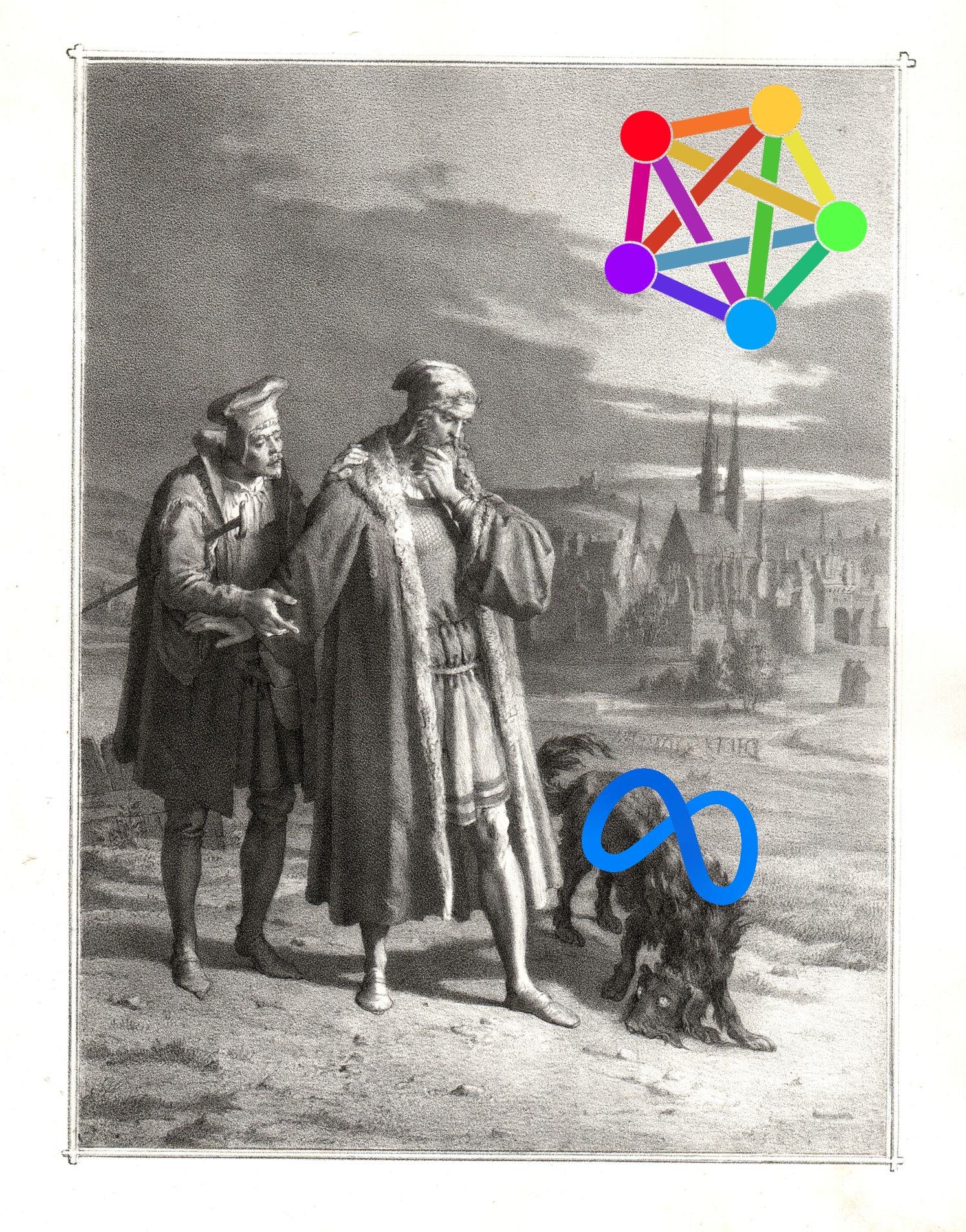Coder, Artist, Blogger (https://fungiverse.wordpress.com/, https://philpapers.org/archive/BINAKR.pdf), Admin of https://diagonlemmy.social
- 22 Posts
- 17 Comments
Even if it doesnt have much impact on activitypub-fedi, I think this is good news for the fediverse in general. X is loosing more and more relevancy and microblogging is more and more happening on federating services.

 1·28 days ago
1·28 days agoRegarding 2: you can also join the Fediverse this way with certain clients I believe. You are automatically signed up for lemmy.world for example

 3·6 months ago
3·6 months agoDo you know how far the development is? (just curious)

 12·6 months ago
12·6 months agoIt’s less about the separation of powers and more about the fragmentation of each power. As in, you should be able to ditch any governing power that you dislike, and curb down its influence on your experience to a bare minimum.
I said separation of powers because you said the Fediverse should be like a democracy. Then it should have that. For me, democracy is first of all a better way to control those in power, which is why I think we shouldn’t think of the Fediverse as a democracy, because it isn’t; at least not currently. It’s not like you have a say in the general development of the Fediverse, because there is no real centre to it anyways.
So, I agree with you here, I just don’t think that’s what a democracy is. If the Fediverse would be a democracy, it would have government, a constitution, etc.
But as I said, I agree with you how we should think of the Fediverse: as acephalous. However, why should it be completely acephalous? Why shouldn’t servers make agreements with one another? The Fedipact is one of those, the badspace, too. And while I’m not a fan of the first one, its generally fine, if they don’t force people into it (like you said). Why then not try to do the same thing but with some actual principles?
What happens if said commitee becomes hostile, defending its own self-interests in detriment of the ones of the rest of the Fediverse?
Then many servers will opt out of it and it will become irrelevant. That’s the beauty of it. Because its only an agreement that is not controlled by any centrlized entity, its not as binding. The same as with the Fedipact: it wasn’t set up by any central entity and will not be enforced by it other than the community or powerful servers. But that the community and powerful servers will try to influence the course of the Fediverse is the the case anyways!
And the ones screwing up on moral matters get isolated.
For Nazi-instances, that’s easy, but for example in the case of Threads, it quickly becomes very complicated to agree on which instances should be isolated and which not. How do you determine that if not through speaking to other servers? And if you do that, you can just as well speak to them about common rights and write them down somewhere. It’s the same thing but with more transparency.
We cannot build the Fediverse without trust and mutual agreements. It will just not work; and we are also already doing it.

 25·6 months ago
25·6 months agoYou make a few good points, I will try to counter them.
The core idea of the fediverse is the same as democracy - that nobody should control the whole. Both are similar enough to allow comparisons.
True, its for separation of powers but this doesn’t mean there cannot be any central rules decided upon. For example the consititution of the united states. However, because the Fediverse doesn’t have a government, I think a better analogy would be a league of more or less democractic countries that work together. Of course they can agree to an universal declaration, like the united nations agreed on human rights for exactly the same reasons.
So yes, I think that instances should defederate Threads and encourage other instances to do so. However, they should not do it too hard, to the point that you’re effectively dictating what others should be doing.
Agreed. However, there is a difference between a constitution of a country and agreements between countries. For example, the NATO has an agreement with the US that if any NATO country is attacked, US will jump in. However, this is completely build on trust, if Trump decides to not jump in, no one will be able to stop him, meaning there isn’t any higher institution that controls the different actors in this agreement other than the actors themselves. This is why I think the analogue of a league of nations is better, because agreements can be much more loose here.
Of course, there would still be a question who would write this document, but the basic idea would be that if it was supported by many servers, it would be put up more or less by word of mouth. To do this most effectively, it would be good to create the document in a way that many servers willing to agree to it. For example through a ActivityPub commitee that exists anyways or a popular meetup of Fediverse servers. And eventually, the most reasonable one will be hold up by the most servers. I think of it as a dynamic process.
But yeah, there would have to be put some thought into it how to craft it and most likely we don’t have the institutions yet to do something like that.
That fallacy has a deep impact across the text because the author believes that people can eventually agree on moral grounds based on reason. Often they don’t - because it depends on the moral premises that each adopt, and moral premises are not true/false matters to begin with.
Could be true, I need to think about this longer. However, I still think that as a foundation, basic fediverse rights could be agreed upon through reason and that they could become effective tools against Meta and to improve the Fediverse in general. Of course, they shouldn’t be too detailed and let enough freedoms how to realize them technically.
the actual problem is that the Fediverse is internally shattered and cannot agree on anything, including basic moral rules and principles.
That is not a problem. That’s a feature.
I think its good that different moral rule sets can easily develop and implemented; but I think sooner or later it will become a problem, at the latest when more radical parts become pre-dominant. Its not like the Fediverse will automatically develop in a good direction. I don’t believe in a hierarchy-free, anarchic society. We need institutions and agreements to ensure that the Fediverse stays a good place.

 01·6 months ago
01·6 months agoThanks! Yeah, I struggle to keep my sentences short. I will keep it in mind :)

 01·6 months ago
01·6 months agoThanks :)

 01·6 months ago
01·6 months agoWell, but that’s what people around the Fedipact are doing. And probably, this is a fraction of the Fediverse that is going to stay

 01·6 months ago
01·6 months agoThat’s true! Updated the image.
You can already see how Meta will also use imagery to establish its centre-position in the Fediverse with its symbol for the Fediverse (it has a centre):

(from https://mastodon.social/@liaizon@wake.st/112139602260820054)
Because you didn’t like the article that much, here only with the coolest images …

 01·6 months ago
01·6 months agoYeah ok, I need to improve my english skills

 01·7 months ago
01·7 months agoI guess its federated so the people running it will determine that.
Also, if you have to sign in with ORCHID, which identifies you, you will be careful to post useless garbage papers. I think the integration of ORCHID is really clever. That’s at least what I think it will be used for too, right?

 01·8 months ago
01·8 months agoI do think that the book carry some important messages like questioning authority, being agents of one’s own life. On the other hand you it is rather conservative and some bad stereotypes.
But the question is: for which novel doesn’t this apply, too? I think one can look past those things if one looks at the overall message here. Also, the universe and the fandom has developed since the original series. Look at the game: its very diverse. Ok, you still have the antisemetic stereotypes, but its definitely a step forward.
So yes, I think the H.P. still has something for society to profit from. The popularity also speaks for itself. If you like it or not, it will stay a part of society for a while.
So instead of banning the whole thing (which is unrealistic in the long run anyways), I think it would be good to embrace its healthy parts for the Fediverse.

 01·8 months ago
01·8 months agoWell, the H.P. fandom stands in the center not Rowling or her books. I think one should differentiate with that.
Also: yes, the books contain antisemitic stereotypes, but Rowling herself hasn’t said herself anything antisemitic to my knowledge. Some of her statemets are transphobic, but the Fediverse has enough room to carry out this conflict.
We are not in centralized social media anymore, where you have to be on the same site as everybody else. If you are on the same instance as a transphobe and you oppose that: change instances. If you don’t want to be on an instance that federates with any transphobe content: change to an instance that de-federated with any of those instances. That’s all possible in the Fediverse.



















I think thats unlikely. If the fediverse wants it or not, its growth is now heavily dependent on Meta